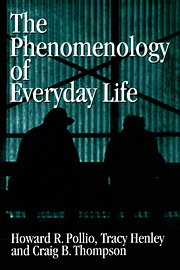Book contents
- Frontmatter
- Contents
- Preface
- PART I EXISTENTIAL PHENOMENOLOGY AND THE SCIENCE OF PSYCHOLOGY
- PART II GROUNDING THE WORLD OF EVERYDAY LIFE
- PART III SELECTED TOPICS FROM EVERYDAY LIFE
- 6 Feeling Alone
- 7 Making Amends: The Psychology of Reparation
- 8 Love and Loving
- 9 Falling Apart
- 10 The Meanings of Death in the Context of Life
- PART IV THE PHENOMENOLOGY OF EVERYDAY LIFE
- References
- Name Index
- Subject Index
9 - Falling Apart
Published online by Cambridge University Press: 04 August 2010
- Frontmatter
- Contents
- Preface
- PART I EXISTENTIAL PHENOMENOLOGY AND THE SCIENCE OF PSYCHOLOGY
- PART II GROUNDING THE WORLD OF EVERYDAY LIFE
- PART III SELECTED TOPICS FROM EVERYDAY LIFE
- 6 Feeling Alone
- 7 Making Amends: The Psychology of Reparation
- 8 Love and Loving
- 9 Falling Apart
- 10 The Meanings of Death in the Context of Life
- PART IV THE PHENOMENOLOGY OF EVERYDAY LIFE
- References
- Name Index
- Subject Index
Summary
In everyday language, we sometimes speak about ourselves and others as “falling apart.” These experiences are described in terms of a loss of personal control combined with a more global sense of not exactly knowing where we are, who we are, or even if we are. These episodes also often involve experiences of tension and depression as well as a sense of being strangely out of tune with the ordinary flow of events and things. When this happens, the world becomes a strange place to the person, and he or she is unable to do anything in that world. It does not seem surprising, under these conditions, to characterize the experience as one of falling apart or cracking up, even if we are not exactly clear what it is that has fallen apart or cracked up.
Within the theoretical language of clinical psychology, but most especially that of psychoanalytic self psychology (Kohut, 1977), such experiences are frequently described in terms of a construct known as fragmentation or annihilation anxiety, with both terms referring to the fragmentation or annihilation of the personal self. As should be clear, episodes of falling apart are profoundly unnerving and interrupt the normal progress of a life. If a person is to get on with the rest of life, however, the episode and its related anxieties must be dealt with and resolved. The resolution to such episodes is thought to take place primarily within the context of a supportive environment, usually involving another person. Within this context, the suffering individual is enabled to overcome the disintegrative effects of anxiety and to reestablish a coherent and continuing sense of personal existence.
- Type
- Chapter
- Information
- The Phenomenology of Everyday LifeEmpirical Investigations of Human Experience, pp. 263 - 297Publisher: Cambridge University PressPrint publication year: 1997



